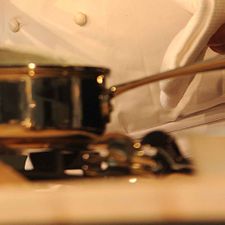Quiz: What Kind Of Composer Are You?
I’ve always been interested in what draws people to a specific vocation or another. Usually it’s some inherent personality trait, and composers share a lot them. But there are also some interesting differences. Here’s a tongue-and-cheek, Facebook-style quiz on random differences that I’ve noticed. Because even iconoclastic, avant-garde composers need to know which type of nonconformist they are.
1. Why do you love sounds?
- I love them for who they are.
- I love them because of what they can do for me.
All composers love sound in one way or another, but I think we are drawn to it in very different ways. Some composers are more interested in timbre: sounds as they exist outside of a context. This can be at the level of characteristic sounds of an instrument, or of a recording, or even in terms of orchestration. Taken further, this becomes the kind of listening that recording engineers use. I would suspect that people who are more interested in refined timbral listening than the generative process of combining sounds often end up as sound engineers instead of composers.
On the other side are composers who listen for the context of sounds. Maybe they still love timbre too but they’re more interested in how sounds move through time. That could mean an interest in rhythms and densities, harmony, phrasing, or the structural aspects of music.Taking this further, you end up with the music theorist, who is fascinated by structure but less interested in creating his/her own music.
Me: B.
2. Who do you write music for?
- For me—who cares what people think!
- For the people who are going to hear it.
- For the people who commissioned it.
Most composers are introverts, as am I, since you need to enjoy long stretches of solitude to be able to compose. For many composers, that’s the end of the story. They write primarily for the joy that comes from putting together ideas. Performances are secondary, or at least repeat performances—you usually need at least a première to see how your idea sounds in space. To say these composers don’t care at all about what other people think would be unfair, but the main reason they write is for themselves.
Other composers write for the audience. This can constitute flagrant crowd-pleasing, but it doesn’t need to. All it means is that after a while the thrill of writing music for its own sake isn’t enough, you want to see that your music matters to someone else. So whether for PhD graduate composers or suburban 12-to-14-year-olds, you write what you feel is good music that will be appreciated by your audience. These composers naturally care a great deal about repeat performances.
A third option is to write for the commissioner. In this group I put film composers and people who write incidental music. This would also describe “competition composers”: the people I’ve met who admit (usually only reluctantly) to trying to write a piece solely to impress a jury. It could also describe people who write functional music and have a very malleable sense of style—composers drawn to companion pieces for instance.
Me: B.
3. Do you like music theory?
- It’s vital and I use it to compose all the time.
- I guess so though I don’t really use it.
- Music theory is a waste of time.
The role of music theory is maybe the most contentious topic among composers, because it gets at fundamentally existential questions. On the one hand are the composers who use theory to build musical structures and flesh them out, à la Ferneyhough or Babbitt. They see theory as a visceral expression of their music, or at the least as a convenient shorthand for developing a structure. This is theory as a distillation of practice.
There are other composers who at some point in their lives try to write music in that way but fail miserably. Or at the least, when they do use theory in a generative way, it doesn’t feel natural—some other path through the compositional process is more comfortable for them. They may believe that theory has its place, picking and choosing what they find useful, but they also don’t believe theory is essential to creating art—theory follows practice in other words.
Finally, there are “anti-theory” composers that willfully position themselves against the music theoretical tradition. They might see it as a holdover from the excesses of modernism or something similar. They take pride in avoiding theory (even to the point of inconvenience) and they emphasize pure, unadulterated, often spiritual paradigms of composing. Theory is harmful to practice is the basic idea.
Me: B.
4. Do you read music criticism?
- I check out the arts pages daily and I always read program notes before the concert.
- Once in awhile when there’s something that piques my interest.
- That stuff makes my eyes glaze over.
I think most musicians enjoy reading previews and reviews of concerts, biographies and interviews with performers or composers, descriptions of particular pieces or styles, etc. It’s the same urge that leads people to track the careers of baseball players or memorize sports stats. Taken to an extreme and paired with a talent for writing, this urge can lead to a career in music criticism or musicology. Also, I think many conductors fall into this camp—you need that kind of brain to develop a strong interpretation of the standard repertoire.
A smaller subset (I think) turns to music criticism only functionally. The odd album review might sway them, or they might read the arts section when they have some free time. This is like people who don’t really care about cars but drive because it’s practical.
Another group of composers doesn’t pay much attention to music criticism. Eyes glaze over when reading program notes, and the arts section of the news is only opened when looking for a review of one’s own concert. Reviews and previews only get read when forwarded by someone else. On the other hand, if a piece of music is really inspiring, these composers might be motivated to go back and read what someone else had to say about it, but before the fact the words have no meaning.
Me: C.
5. Why do you want to compose?
- Music is so amazing, I love to make things, and I want to be a part of that.
- I love the idea of music, and it has the potential to be amazing, but I always felt like it could be somehow improved.
I would be surprised to find a composer that doesn’t like to fashion things for themselves—this is one of the primal urges behind the discipline. But I do think composers are drawn to fashioning music specifically (as opposed to furniture or dance choreographies) for different reasons.
One group falls in love with music. They voraciously absorb everything, and they remember a lot of it because it makes a profound impact. Some of them are into cataloguing—these are the people who drop opus numbers and talk about the differences between Bach recordings in casual conversation. Some of them just have a love of a particular kind of musical expression and want to make more of the good stuff, in the same way that a baker who loves chocolate wants to make lots of chocolate cakes. These composers get a lot out of score study and close listening, and they use these opportunities to expand their craft.
Other composers turn to the discipline because they wish music were better. Obviously, at some point there are some transformative moments that show them how great music can be, but these people are always in search of something greater. They treat music the way Google treats its search algorithm: a perpetually changing work in progress. They may or may not know the repertoire very well—this is tangential to composition for them, since so much of music is not worth listening to in the first place. They get a lot out of working out compositional problems on their own and much less from score study or close listening.
Me: B.


